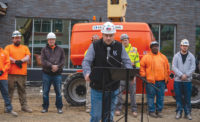As the industry continues to look for solutions to fight opioid addiction among its ranks of craft workers, some larger contractors are hiring third-party suppliers of Narcan and health care organizations as turnkey solutions.
Boston-based Shawmut Design and Construction, for example, has supplied Narcan on its 150 jobsites, but it took a few years to work out the kinks, says Shaun Carvalho, Shawmut’s chief safety officer. “Employees began to express interest in hearing about opioids and substance use disorder (SUD) leading up to 2018 Safety Week and we wanted to get ahead of the curve,” Carvalho says.
Related Link:
Bringing Opioid Misuse at Jobsites out of the Shadows
Initially, the firm’s safety team members were trained by Blue Cross Blue Shield to deliver training on emergency response using Narcan. Shawmut then worked with its Opioid Task Force and collective resources, including the Grayken Center for Addiction, to create an enhanced training program including awareness, and SUD, including the administration of Narcan, which was used to initially train 300 people, Carvalho says. “We conduct frequent training open to all Shawmut employees in the hopes of educating everyone,” Carvalho says.
In a 2019 pilot, Blue Cross provided Narcan kits that Shawmut distributed to all its offices and at some of its larger jobs, Carvalho says. “The goal was to get this information and life-saving equipment out to our jobs,” he says.
Since Narcan had a two-year shelf life and the Blue Cross pilot was ending by 2021, Shawmut had to find another solution. With Shawmut jobsites now eager to supply Narcan, the construction management firm realized it could not rely on a CVS pharmacy to “supply its 150 jobsites coast to coast with a hundred cases of Narcan” says Carvalho. Shawmut also had no luck approaching suppliers of its First Aid kits on jobsites.
PDF Download: Shawmut's pre-task plan helps workers prepare for work and prevent injuries on the job.
View the Plan
Courtesy Shawmut Design and Construction
With national jobsites creating weekly job overlap and turnover, the national construction manager needed a partner to help deal with complicated logistics in setting up its Narcan program, Carvalho says. Following an extensive search, Shawmut formed a partnership with Rockville, Md.-based Emergent BioSolutions, maker of Narcan nasal spray, and its distributor Truax Patient Services in December 2021. It spent a few months working through requirements with Emergent, including assurance it would provide trained staff, medical oversight, and other legalities, before the program was ready for launch.
Setting up the program also required support from Shawmut’s development team to provide “one stop where people can order everything they need on a jobsite, such as Narcan or a hard hat for safety,” Carvalho says. “We wanted to give our project teams the power to order the Narcan themselves and make sure they’ve got the trained staff on site.”
Before initiating the program, Shawmut hired a registered nurse to serve as a case manager for the company and serve on its Opioids Task Force. The nurse assists with SUD and Narcan trainings, assuring employees receive proper medical care in the event of an injury or an overdose. “She also trains superintendents and others for all our jobsites,” Carvalho says.
Shawmut wellness training focuses on total worker health. It offers training in substance use disorder (SUD) recognition and other resources through its Employee Assistance Program. Training also includes opioid overdose and emergency response, including how to issue Narcan if somebody should go unconscious, Carvalho says.
Today, all of Shawmut’s field staff have undergone SUD training, which includes emergency response for opioid overdose and can order Narcan, regardless of whether they are a medic, Carvalho says.
So far, Shawmut has had “zero” occasion to use Narcan on the job site, but “our teams are ready should the need arise,” Carvalho says.
Since Shawmut launched its Narcan program, it has been receiving phone calls from contractors interested in how it got stared. The firm created a “blueprint” to share info about its program with other construction companies and has joined with some to help with their program launches, he says. “We share many of the same workers…they can be on our job site today, up the street tomorrow and back next week,” he says. “It's a real close, tight- knit community, so we have to look out for one another.”





Post a comment to this article
Report Abusive Comment